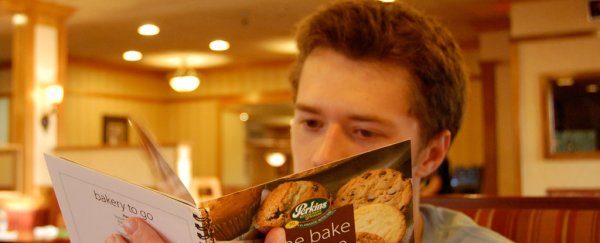They say you should never do your grocery shopping while you're feeling hungry – as you're liable to put all kinds of yummy snacks in your basket or trolley that you really shouldn't be purchasing.
And the exact same logic applies in ordering food when you're out, researchers have found, after running three experiments that showed people who order meals well before eating them generally choose healthier food options with less calories.
"Our results show that ordering meals when you're already hungry and ready to eat leads to an overall increase in the number of calories ordered, and suggest that by ordering meals in advance, the likelihood of making indulgent purchases is drastically reduced," said researcher Eric M. Van Epps from the University of Pennsylvania, who conducted the study while at Carnegie Mellon University.
To examine how the timing of our food orders affects the kind of meals selected, Van Epps and fellow researchers ran two experiments with almost 700 company employees dining at an onsite corporate cafeteria, and another test with 195 university students.
In the first experiment, the employees could place their lunch orders any time after 7am, with the meals being picked up any time between 11am and 2pm. The researchers found that for every hour of delay between the ordering time and when food was picked up, there was a decrease of 38 calories in the meal chosen.
In the second study, employees were randomly assigned to place their food orders before 10am or after 11am, and again those who had to wait longer after ordering their lunch selected meals with less energy. The participants obliged to order early – when they were less hungry – picked food with 30 calories less on average.
While the overall average gap in calories between the early orderers and the late orderers wasn't huge – 568 calories as opposed to 598 calories – it's a difference that, day after day, could end up making a difference in terms of your diet.
"These findings provide one more piece of evidence that decisions made in the heat of the moment are not as far-sighted as those made in advance," said one of the team, George Loewenstein from Carnegie Mellon University.
"Unfortunately, pre-commitment strategies are more feasible when it comes to diet than to many other 'hot' behaviours."
In a third experiment, the students were randomly assigned to order catered meals before or after class, with the meals being served immediately once the lesson was finished.
The students who picked their food before the class chose meals with an average of 890 calories, while the group who selected their food as they were about to eat it chose options with an average of 999 calories.
"One nice thing about these studies is that we were able to separate timing from other things that happen when mealtime gets closer, like seeing or smelling the food," said researcher Julie Downs. "So we know that the effects are due to how imminent the meal is, and as a meal gets closer we see that people seem to give in a lot more to the temptation of high-calorie foods. But making a decision in advance can help people choose something that might be a bit more healthful."
While the researchers only looked at people ordering food in controlled circumstances, it stands to reason that the same behaviours could make it easier to pick healthier meal options if you're making food at home in advance of meal times.
Obviously waiting until lunch time hits at work to decide what to eat makes the temptation of immediate fast food options something you'll have to contend with – but if you'd already prepared a salad sandwich that morning while sated by breakfast, that longing would be much easier to overcome.
And not only will it be better for you, but restricting calories has been linked with increases in longevity, as eating less seems to slow down genetic processes related to ageing.
Plus, a recent study found that participants who restricted what they ate felt psychologically better than people who ate whatever they wanted, reporting improved mood, reduced tension, better general health and a higher sex drive. Less is truly more!
Of course, that's not all just going to happen overnight if you order your lunch one hour earlier than usual – but hey, it's not a bad place to start.
The findings are reported in the Journal of Marketing Research.
